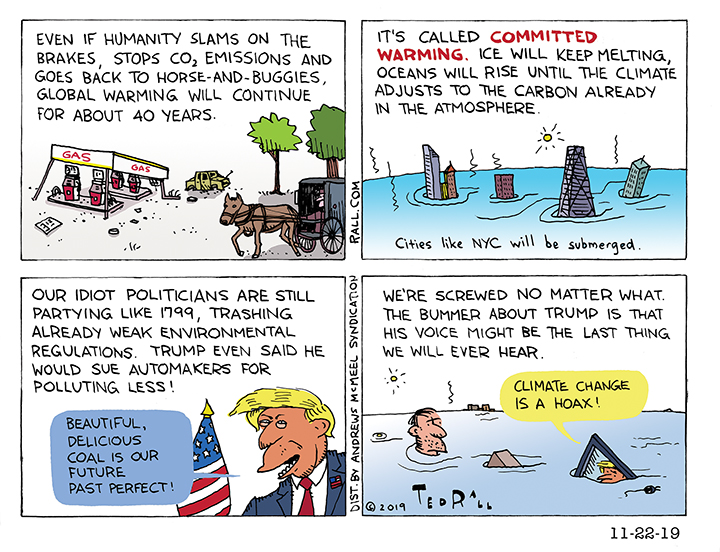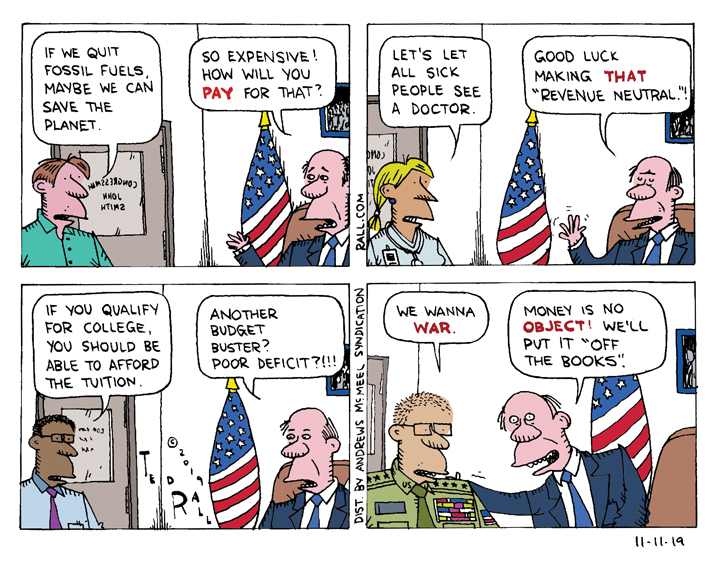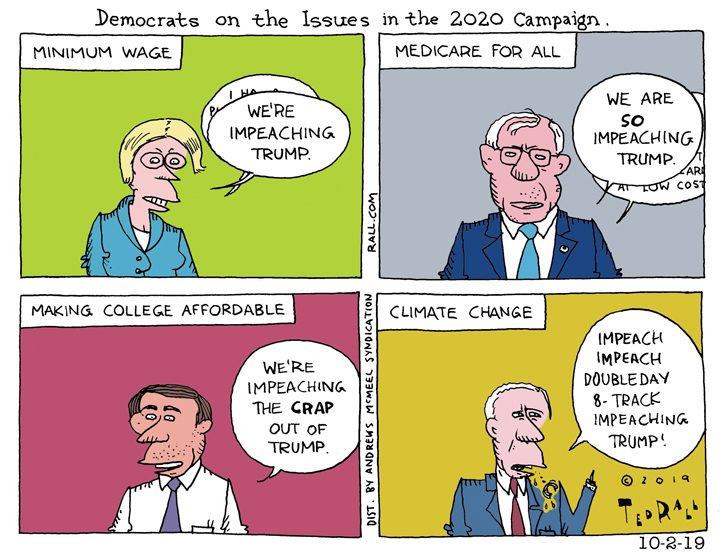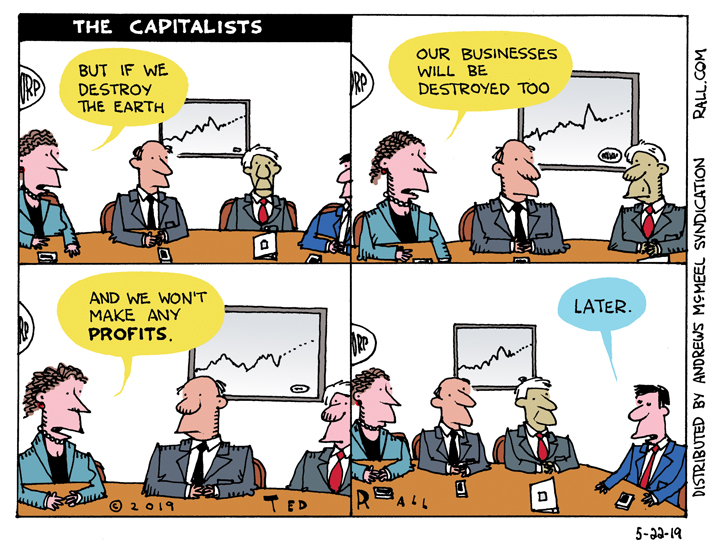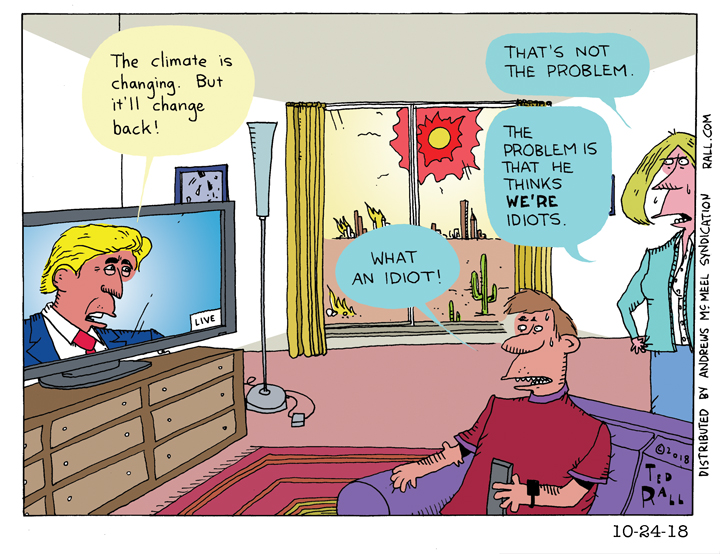Even if humanity slams on the brakes, stopped emitting carbon dioxide and goes back to horses and buggies, global warming will continue for at least a few more decades. So although Donald Trump and his rolling back of air pollution emissions standards are annoying, it’s probably too late anyway.
Democrats on the Issue(s) in the 2020 Campaign
Democrats were poised to wage a substantial campaign based on the issues against Donald Trump next year. The likely front runner at this point, Elizabeth Warren, has a plan for everything. These are issues that most working Americans care about, like the minimum wage and healthcare. But now that they’ve decided to impeach Trump, the odds of those issues getting any serious play have all but evaporated.
Left, Center and Right: We’re All in Denial About Climate Change
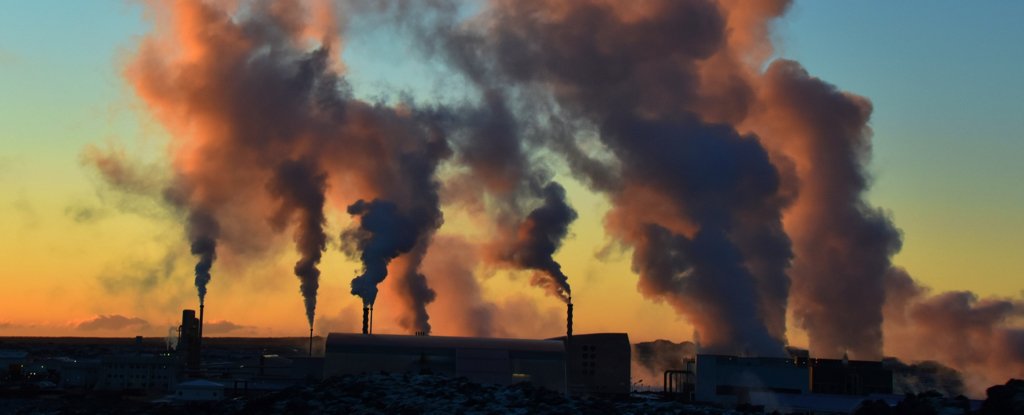 The political left, center and right do share something in common in today’s polarized America: we’re all in denial. The first step in 12-step programs begins with admitting that you have a problem for a reason: you can’t tackle a challenge whose existence you refuse to acknowledge. “From a psychoanalytical viewpoint, denial is a pathological, ineffective defense mechanism,” doctors M.S. Vos and J.C. de Haes observed in their 2006 study of cancer patients. A stunning 47% of the patients they polled denied that they had cancer! Denial reduced their chances of seeking treatment and then following through.
The political left, center and right do share something in common in today’s polarized America: we’re all in denial. The first step in 12-step programs begins with admitting that you have a problem for a reason: you can’t tackle a challenge whose existence you refuse to acknowledge. “From a psychoanalytical viewpoint, denial is a pathological, ineffective defense mechanism,” doctors M.S. Vos and J.C. de Haes observed in their 2006 study of cancer patients. A stunning 47% of the patients they polled denied that they had cancer! Denial reduced their chances of seeking treatment and then following through.
“On the other hand,” Vos and de Haes observed, “according to the stress and coping model, denial can be seen as an adaptive strategy to protect against overwhelming events and feelings.” Denial lets you feel better.
We think of climate change denial as a right-wing phenomenon. Indeed, only 56% of Republicans accept the scientific consensus that the earth is heating up; fewer still believe that humans are responsible, compared to 92% of Democrats who agree with scientists.
Those who deny that climate change is real are engaging in what psychologists call “simple denial.” But those on the left aren’t much better. Liberals who think global warming is real often resort to “transference denial”: they blame the right and corporate polluters even though we’re all responsible. The scale of the climate crisis and the level of sacrifice and disruption that would be necessary to mitigate it feels overwhelming. A widely-reported analysis predicted that human civilization will collapse in 30 years. Others say it’s already too late to save ourselves.
“We’re doomed,” predicts Mayer Hillman, a senior fellow emeritus at University of Westminster’s Policy Studies Institute. “The outcome is death, and it’s the end of most life on the planet because we’re so dependent on the burning of fossil fuels. There are no means of reversing the process which is melting the polar ice caps. And very few appear to be prepared to say so.”
He’s probably right.
Bernie Sanders recently proposed the most ambitious assault on greenhouse gas emissions ever floated in U.S. politics, a $16.3 trillion plan to transition out of carbon-based fuels by 2050. By that time, though, we’ll be dead.
As aggressive as Sanders’ plan is, it doesn’t go nearly far enough or fast enough. Yet Republicans and some Democrats say it’s too expensive. No one in corporate media is taking Sanders’ idea seriously. It’s stillborn.
Liberals post their concern to social media. Some even attend protest marches. But they’re hardly acting like we face an existential crisis.
The 16-year-old Swedish climate activist Greta Thunberg told world leaders: “I don’t want you to be hopeful, I want you to panic. I want you to feel the fear I feel every day and then I want you to act.”
Panic? Our “leaders” don’t give a crap. They’re too bought and too stupid to act.
The bird population in the U.S. has collapsed by 29%—a total of 2.9 billion fewer birds—over the last 50 years. During that same period we lost half the world’s fish. Insects are on the way out too. “No insects equals no food, [which] equals no people,” says Dino Martins, an entomologist at Kenya’s Mpala Research Centre.
None of this should come as a surprise. We were warned. “The oceans are in danger of dying,” Jacques Cousteau said in 1970. Life in the oceans had diminished by 40 percent in the previous 20 years.
If you really believe that the planet is becoming uninhabitable, if you think you are about to die, you don’t march peacefully through the streets holding signs and chanting slogans begging the corrupt scoundrels who haven’t done a damn thing for decades to wake up and do something. You identify the politicians and corporate leaders who are killing us, you track them down and you use whatever force is necessary to make them stop. Nothing less than regime change stands a chance of doing the job.
Nothing else—the struggle for income equality, gun control, abortion—matters as much as attacking pollution and climate change.
Anything short of revolution and the abolition of consumer capitalism is “minimizational denial“: admitting the problem while downplaying its severity. Anything short of a radical retooling of the global political system that establishes state control of the economy with environmental impact as our first, second and third priorities is a waste of time that dooms the human race to extinction.
There is no middle ground, no splitting the difference, no compromise. “Good enough” isn’t good enough. Mere progress won’t cut it. Human survival is a pass-fail class. The final exam is tomorrow morning—early tomorrow morning.
Time to get serious, godammit.
(Ted Rall (Twitter: @tedrall), the political cartoonist, columnist and graphic novelist, is the author of “Francis: The People’s Pope.” You can support Ted’s hard-hitting political cartoons and columns and see his work first by sponsoring his work on Patreon.)
Here is Exactly Why Congress Won’t Act on Gun Violence, Climate Change, Impeaching Trump or Anything Else
 I’m from Dayton so I’m thinking about this today: Why hasn’t Congress done anything to address our national epidemic of mass shootings, namely reviving the assault weapons ban? People—Democrats and not a few Republicans—ask me that all the time. I bet all left-leaning pundits get that question.
I’m from Dayton so I’m thinking about this today: Why hasn’t Congress done anything to address our national epidemic of mass shootings, namely reviving the assault weapons ban? People—Democrats and not a few Republicans—ask me that all the time. I bet all left-leaning pundits get that question.
The answer is simple. But it’s not something most people want to hear. It’s the same answer I give to another question I get a lot: why hasn’t Trump been impeached?
Congress hasn’t gotten off its collective pasty lobbyist-fattened ass because the streets of every major city are not currently filled with millions of pissed-off people throwing rocks at store windows and who refuse to go home until Congress passes real gun control.
Democratic voters want Trump impeached. They want it—lackadaisically. They don’t want him impeached so badly that millions of demonstrators are willing to fill the streets of every major city day after day, night after night, turning over police cars and setting stuff on fire, until Nancy Pelosi begins impeachment hearings.
This is a fun game! You name an issue lots of people care about. I’ll explain why the political class is ignoring it.
For example: What with experts predicting imminent human extinction, 98% of Americans are worried about climate change. (Who are the 2%? Happy to die but too lazy to commit suicide?) So why isn’t the U.S. government doing anything about it? Because—yes, you’ve got it now—the streets of America’s major cities are not choked by millions of citizens up for breaking things and fighting back the cops 24-7 until the politicians do something to increase humanity’s odds of survival.
You may disagree with my answers on the grounds that breaking windows is mean to storeowners, that burning things generates toxic gases, that cops are scary or that it’s more fun to sit home watching TV or playing video games than to run around in the streets dodging tear gas. You can rightly point out that the United States has no organized left-wing political group, much less one on the grassroots level, capable of organizing a mass street movement. You can, even more rightly, point out that we shouldn’t have to take to the streets because it’s Congress’ goddamn job to fix the environment and get rid of our insane president and ban the sale of military-grade guns to inbred derps.
What you cannot argue is that I am wrong.
It is an irrefutable incontrovertible fact that, when the nation’s cities are clogged with millions of angry Americans demanding radical change day after night after day after night, who break stuff and refuse to disperse and fight back against the cops and are willing to get beaten up and sometimes killed for their cause, and it’s impossible to carry on business as usual, our worthless public officials will yield to their demands and do what’s right.
Until then, mass shooters will continue to terrorize our public spaces, SUVs will belch greenhouse gases and Trump will tweet crazy racist BS. Bad things happen because good people don’t force them to stop.
Wishing out loud for other people, like Congress, to do something is worse than worthless. It’s damaging. You’re abdicating your responsibility to act. If you trust in “leaders” whose history shows they can’t be trusted, you’re committing political suicide.
(Ted Rall (Twitter: @tedrall), the political cartoonist, columnist and graphic novelist, is the author of “Francis: The People’s Pope.” You can support Ted’s hard-hitting political cartoons and columns and see his work first by sponsoring his work on Patreon.)
Don’t Worry, the Government Will Solve Climate Change Even Though They Can’t Solve Anything Else
What it comes to climate change, most Americans think to themselves: someone will figure something out. And by someone, they probably mean the government. But this is the very same government that doesn’t seem to be able to address almost any other problem, most of which are much less complicated than climate change.
SYNDICATED COLUMN: Donald Trump’s Other Lies: His Campaign Promises

This week’s political coverage — probably next week’s too — will likely be dominated by deposed FBI director James Comey’s incendiary testimony before the Senate Intelligence Committee. However, Trump’s “lies, pure and simple” are limited neither to the president’s claim that Comey’s FBI was “in disarray, that it was poorly led” nor his litany of falsehoods — most recently, that the mayor of London doesn’t care about terrorism and that Trump’s First 100 Days were the most productive of any president in history.
Comey’s lucid, Hemingway-tight testimony feels like the beginning of the end for this administration. Anything could happen, of course. But it feels overly optimistic to imagine this circus lasting another year.
If and when the obituary for Trump’s political career is written, his admirers will record his historic, meteoric rise. Indeed, Donald Trump was the most effective presidential campaigner of my lifetime: repeated what lines worked, ditched the ones that didn’t, mastered social media, ignored outdated dogma, tapped into voters’ long-ignored resentments, nailed the electoral college map, and did it all for pennies on the Hillary Clinton donor dollar.
True, the brilliant campaigner can’t govern. But that’s a story for another time.
His critics’ postmortems will emphasize that Trump’s brightly burning campaign rallies were fueled by lies: Obama was Muslim, Obama wasn’t born here, global warming is a Chinese hoax, illegal immigrants are streaming across the border (years ago they were, no longer), police officers are the real victims (as opposed to the numerous black men they shoot).
These lies are scandalous. They ought to be remembered. But we shouldn’t let them overshadow Trump’s biggest lie of all: that he would be different, outside the ideological box of the two parties.
“Trump meets the textbook definition of an ideological moderate,” Doug Ahler and David Broockman wrote in the Washington Post last December. “Trump has the exact ‘moderate’ qualities that many pundits and political reformers yearn for in politicians: Many of Trump’s positions spurn party orthodoxy, yet are popular among voters. And like most voters — but unlike most party politicians — his positions don’t consistently hew to a familiar left-right philosophy.”
Trump promised a hodgepodge ideology, a “pick one from column D, pick one from column R” Chinese menu that appealed to many voters whose own values don’t neatly adhere to either major party platform. Who cares about doctrine? Let’s do what works.
As president, however, that turned out to be a lie.
Trump has governed to the far right. In fact, on just about every issue you can think of, Donald Trump has governed as the most extreme far-right politician of our lifetimes, and possibly in the history of the Republican Party.
Candidate Trump criticized North Carolina’s “bathroom law” and said Caitlyn Jenner could use whichever bathroom she wanted in Trump Tower. President Trump rescinded the right of transgender students to use the school restroom of their choice.
Flip, flop, from somewhat to right-wing conservative, over and over and over again.
Candidate Trump lit up the GOP (and relieved not a few Democrats) by criticizing the stupid Iraq War and promising to put America First. President Trump’s cabinet of generals is bombing the crap out of Syria and asking Congress for a 10% increase in Pentagon spending.
Candidate Trump was all over the place on abortion rights. President Trump is trying to defund Planned Parenthood and appointed Supreme Court justice Neil Gorsuch, a right-wing extremist who will likely cast the decisive vote against Roe v. Wade.
Candidate Trump promised bigger, better and cheaper healthcare for all Americans. Trumpcare will leave tens of millions of patients with no insurance whatsoever.
He even welched on his most controversial promise: to improve relations with Russia. Within a few months, he allowed that U.S.-Russian relations “may be at an all-time low.”
“Trumpism was never a coherent worldview, much less a moral code that anchors the president,” Graham Vyse wrote in The New Republic.
#Wrong!
Trumpism is extremely coherent and consistently extremist. Donald Trump turns out to be Ronald Reagan times ten, minus charm.
(Ted Rall (Twitter: @tedrall) is author of “Trump: A Graphic Biography,” an examination of the life of the Republican presidential nominee in comics form. You can support Ted’s hard-hitting political cartoons and columns and see his work first by sponsoring his work on Patreon.)
SYNDICATED COLUMN: Mass Shootings Are The New Normal. Get Over It.
 What is wrong with Americans?
What is wrong with Americans?
Okay, that’s a very open-ended question with many potential answers.
What I’d like to talk about this time is: why is it that Americans only begin to get serious about a problem after it’s too late to solve it?
Currently, I’m thinking about the latest, depressingly predictable response to the Orlando massacre.
As usual, right-wingers like Donald Trump want to restrict immigration. But even setting aside the obvious moral and practical economic objections to nativism, how would that prevent future mass shootings (in part) in the name of the Islamic State? Orlando shooter Omar Nateen wasn’t an immigrant. He was born in Queens, New York; his parents were from Afghanistan. If the Republicans’ goal is to get rid of potentially self radicalized Muslims, it’s too late. There are 3.3 million Muslims in the United States. Many are full-fledged citizens.
Any group of people that numbers in the millions includes some who are mentally ill, some who are politically radical, some who are religious fundamentalists, and some who are some combination of all three. Since it’s illegal to deport U.S. citizens, millions of whom are Muslim, a few of whom are crazy – and the United States insists on pursuing an endless “war on terror” against Muslim countries – there’s no way that a policy of reduced immigration can prevent future attacks by homegrown Islamists.
On what passes for a Left, Democrats like Hillary Clinton are pushing for tighter restrictions on guns. As usual.
Indeed, it’s hard to argue that civilians require military grade weapons like the semi-automatic AR-15 assault rifle used to kill 49 people at the Pulse nightclub. Hunters don’t use them. If the AR-15 is legal, why not hand grenades? Had Nateen been forced to use a pistol or long gun instead, his bullets would have been smaller, the death toll lower. Some of his victims might have been able to overpower him as he tried to reload.
Here again, however, it’s too late to fix the problem. The cat is out of the bag. Two years ago, the national sport shooting foundation estimated that there were between 5 million and 8.2 million assault-style rifles in American homes. Sales of these weapons always spike after mass shootings, so it’s a safe bet that that number has risen by at least 1 million or two since then.
Even if Hillary Clinton were to succeed beyond her wildest dreams, assault weapons were banned permanently, what about those millions of AR-15’s already in circulation? Would she be willing to send jackbooted federal thugs door to door to search every home until every last one of them, or at least the lion’s share, were rounded up and melted down? Of course not.
The truth is, this ship sailed back in 2004 when Congress allowed the federal ban on assault weapons to expire without being renewed. Congress’s failure to act over the last 12 years has transformed the United States into a nation awash in military hardware.
Mass shootings are the new normal. Get over it.
“It’s too late to do anything about it, now let’s act” mania appears to have become as much of a part of our national character as the myth that everyone is a member of the middle class.
Progressives and liberals who form the base of the Democratic Party, most of whom supported Bernie Sanders during the primaries, are engaged in a robust debate over whether to switch over to Hillary Clinton this fall, support a third-party candidate like Green Party presidential nominee Jill Stein, or stay home on election day. It’s the same old question: Do you vote for the lesser of two evils? Isn’t that voting for evil?
Democrats for Clinton are trying to convince Bernie Sanders voters that November represents an existential threat, that if Donald Trump is elected everything we know and love about America will be destroyed. They don’t get it.
What the Clintonites don’t understand is that it’s already too late. Yes, if Donald Trump gets in, there’s a strong danger that what’s left of American democracy will yield to something radically new and terrifying, full-fledged authoritarianism. But Hillary Clinton also represents something horrible: a continuation of the neoconservatism that led to the invasion of Iraq, has made the United States a target of Islamist terrorism, complete capitulation to the banking class whose power structure relies upon the vast majority of American workers toiling for longer hours and shrinking wages – in effect, the last nail in the coffin of the idea that ordinary people have the right to imagine themselves and their children living better than they have in the past.
The existential battle isn’t in November. It was a couple of weeks ago, when Hillary Clinton appeared to nail down the Democratic presidential nomination. Whatever happens now, whether authoritarian Trumpism or steady-as-she-goes downwardly mobile Clintonism, we are screwed.
Perhaps no issue better illustrates my point than climate change.
I remember watching Jacques Cousteau on television in the 1970s, when he repeatedly warned that the oceans (along with the rest of the planet) were warming, and that it would soon – might already be – too late to stop it. The politicians and corporate executives, of course, ignored him and the other scientists who said the same thing. Now, finally, the political class is giving lip service to the crisis, though action remains in short supply.
The fact is, Cousteau was probably right. It was probably too late to save the planet back then. It’s certainly too late now. The climate science is clear. The polar ice cap is never coming back; Antarctica is melting away. The process can’t be reversed. Even if every internal combustion engine in the world stopped running tomorrow morning, human beings have pumped too much energy into the closed system that is our atmosphere to reverse global warming.
My intention isn’t to bum you out. All I’m saying is, let’s stop focusing on problems we can’t do anything about and work on those we still can.
(Ted Rall is the author of “Bernie,” a biography written with the cooperation of Democratic presidential candidate Bernie Sanders. His next book, the graphic biography “Trump,” comes out July 19th and is now available for pre-order.)

